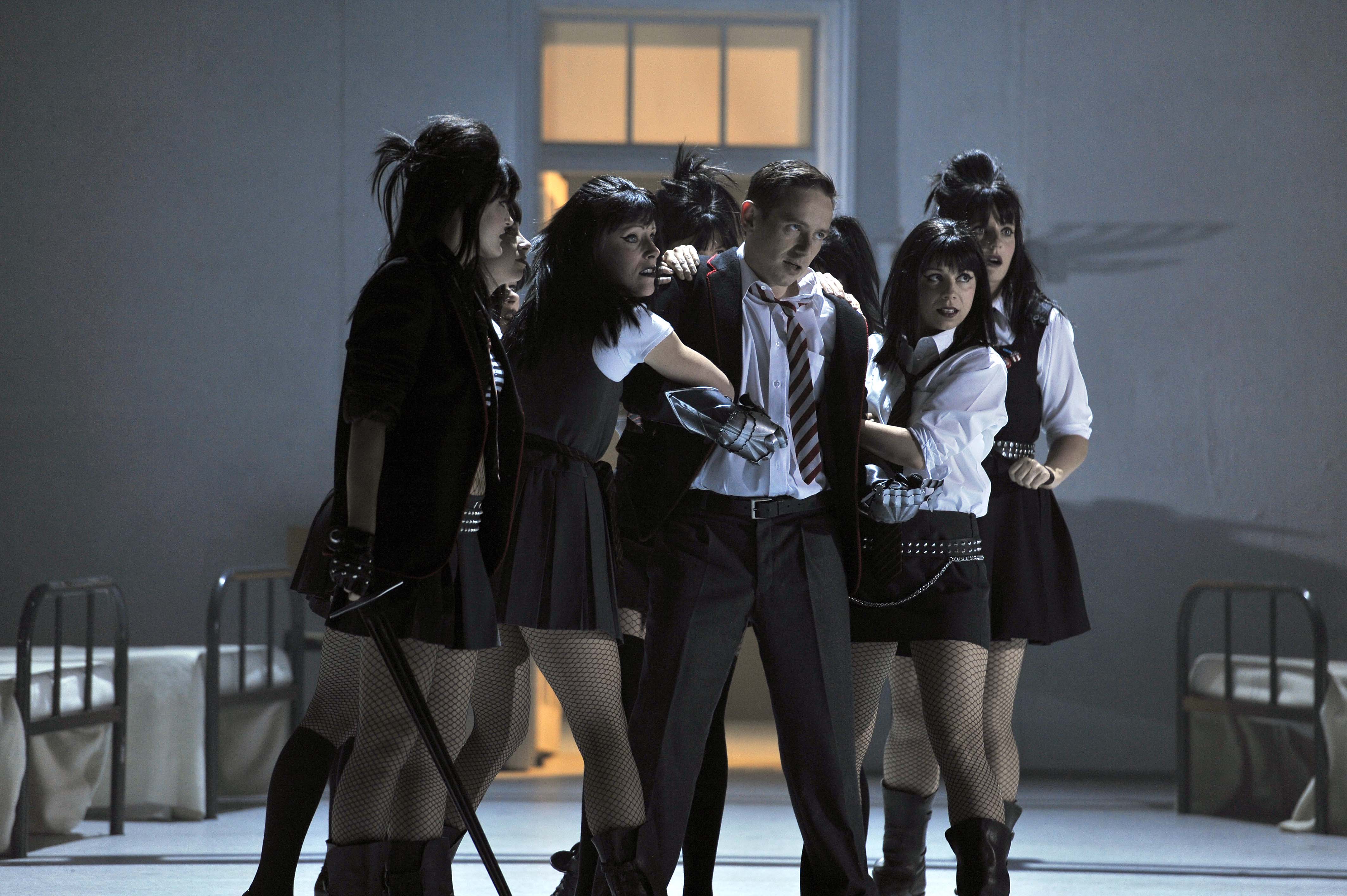God it’s good to laugh in an opera house. Not a hear-how-clever-I-am-to-get-the-laborious-operatic-joke laugh, or an I-realise-this-is-supposed-to-be-funny-so-I’m-playing-along one, but a real, spontaneous laugh that tickles into sound before you’ve even had time to register its approach. Back for its second appearance, Robert Carsen’s Glyndebourne Rinaldo is ingenious and witty, joyous and completely over-the-top, and the best possible ending to this year’s summer opera season.
Back in 2011 the show was great, but still felt like a work-in-progress. Three years on, and Rinaldo is back and suddenly everything that was slightly blurry before has snapped into focus and the results are slick and seriously entertaining.
The Furies become a troupe of feral, St Trinians-inspired schoolgirls
A frankly daft Crusading plot is reworked as the cartoonish fantasies of a schoolboy. Bullied by his classmates and bored of his history lesson, he recasts the Crusades with himself as warrior-hero Rinaldo and his teachers as wicked queen Armida and the Saracen king Argante. Rinaldo’s beloved Almirena – a speccy blonde with Heidi-plaits, first glimpsed as a photo that the schoolboy lover is enthusiastically snogging – is captured not by the hellish Furies of mythology, but rather a troupe of feral, St Trinians-inspired schoolgirls who set about their victim with lacrosse sticks and black painted fingernails.
 There will be those who say that such a riotous reworking fatally undermines the opera, trading drama for cheap laughs. But really, what drama? There’s the unconvincing moment when Armida intends to kill Rinaldo but finds herself suddenly seduced by his beauty instead, or the moment Almirena talks herself out of captivity in a fairly brisk conversation and a few tears. This opera, designed as the young Handel’s calling-card for the London stage, is as much about spectacle as action. Its plot is overwrought, exaggerated beyond conviction (even by Handel’s standards) and would fall flat with a contemporary audience if played straight.
There will be those who say that such a riotous reworking fatally undermines the opera, trading drama for cheap laughs. But really, what drama? There’s the unconvincing moment when Armida intends to kill Rinaldo but finds herself suddenly seduced by his beauty instead, or the moment Almirena talks herself out of captivity in a fairly brisk conversation and a few tears. This opera, designed as the young Handel’s calling-card for the London stage, is as much about spectacle as action. Its plot is overwrought, exaggerated beyond conviction (even by Handel’s standards) and would fall flat with a contemporary audience if played straight.
Carsen’s skill here is in taking a simple conceit and extending it to its logical limits. Every detail in his fantasy schoolroom Crusade is ingenious; the jokes keep coming and the two worlds keep on dovetailing so neatly and so whimsically that you can’t but grin at the boisterous elegance of it all. From the trials of Armida’s evil monsters (an explosive chemistry lab) to rearing and prancing horses (bicycles) and the opera’s climactic battle, transformed here into a blissfully choreographed football match, the whole production glows with love and thought.
 Carsen’s concept is a strong one, but the cast selling it are equally strong. In 2011, Sonia Prina’s Rinaldo was ballsy and pugnacious but not terribly funny. Countertenor Iestyn Davies (pictured left with Furies) brings the same clarity and virtuosity to his coloratura, while also supplying the humour that ties this show together. He sets the tone for a cast alive to every comic possibility, while periodically pausing to remind us just how beautifully he can spin a legato line, how expressively he can ornament a da capo.
Carsen’s concept is a strong one, but the cast selling it are equally strong. In 2011, Sonia Prina’s Rinaldo was ballsy and pugnacious but not terribly funny. Countertenor Iestyn Davies (pictured left with Furies) brings the same clarity and virtuosity to his coloratura, while also supplying the humour that ties this show together. He sets the tone for a cast alive to every comic possibility, while periodically pausing to remind us just how beautifully he can spin a legato line, how expressively he can ornament a da capo.
Davies’ bright, projected tone finds a softer foil in Tim Mead’s Goffredo, particularly fine in his moving final aria. It’s tough competition for fellow countertenor Anthony Roth Costanzo, who makes his Glyndebourne debut as the young Eustazio, displaying a sweet but sometimes slightly nasal tone.
Karina Gauvin steps into Armida’s dominatrix stilettos with panache. Hers is a pedigree Handel voice, creamily full and even throughout, and rather than play the queen as a one-dimensional villain, she finds a humanity to her violence and vengeance that helps anchor Carsen’s wilder fantasies. She’s well matched in Joshua Hopkins’ Argante, storming and plotting in some of Handel’s finest music.
Conductor Ottavio Dantone’s speeds seem to have settled since 2011, and the relationship between pit and stage is greatly improved. Only Almirena’s exposed unison aria with solo violin “Bel piacere” teeters slightly. It’s good to her The Orchestra of the Age of Enlightenment sounding so much like a European band – bolder, more rhetorical than often – and it helps add clarity to musical drama that could easily get lost among so much onstage activity.
Baroque in every way, Robert Carsen’s Rinaldo is Handel opera reimagined for a contemporary audience. Little of the composer’s original plot may remain, but all of his joyous invention and spectacle does – reanimated by some healthy irreverence and an eye for detail. This is opera, certainly, but it’s also entertainment, and there’s absolutely nothing wrong with that.
- Rinaldo at Glyndebourne until 24 August














Add comment